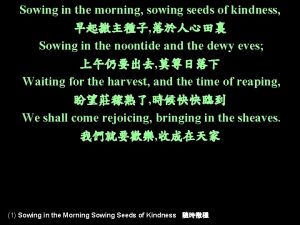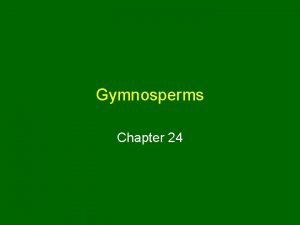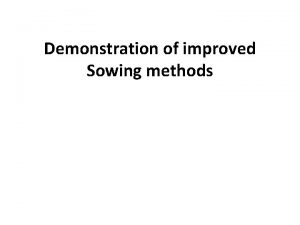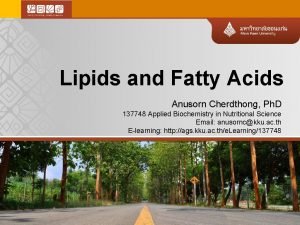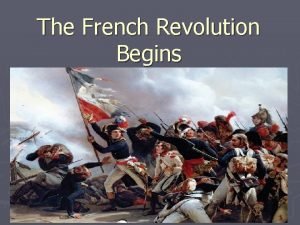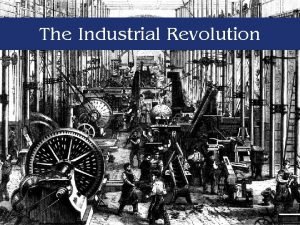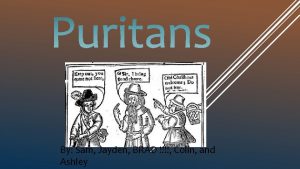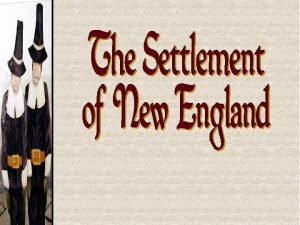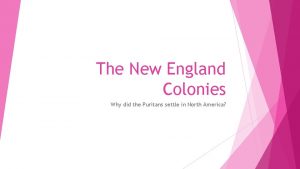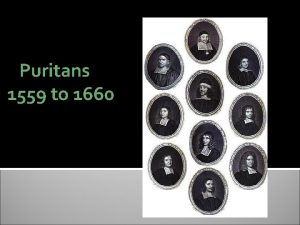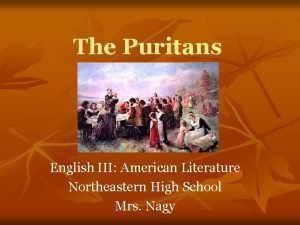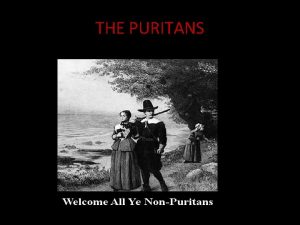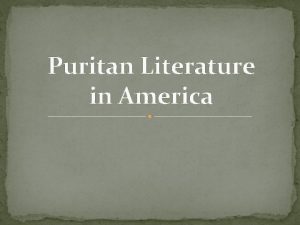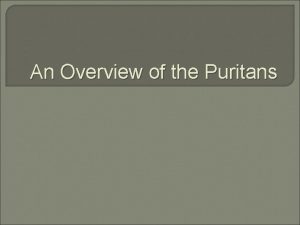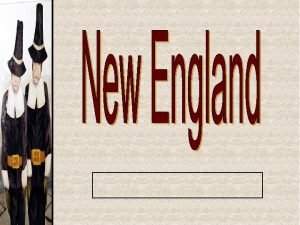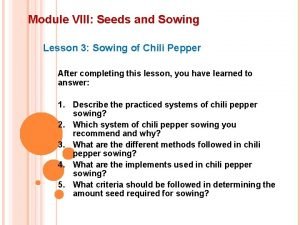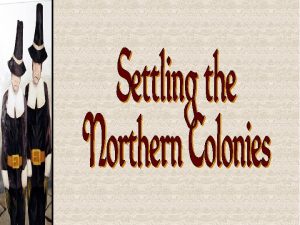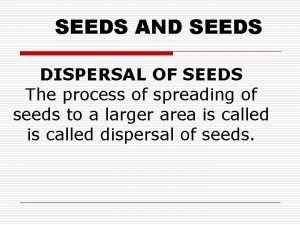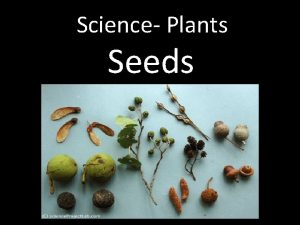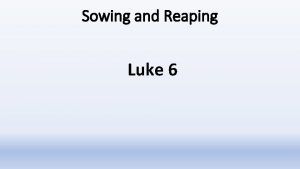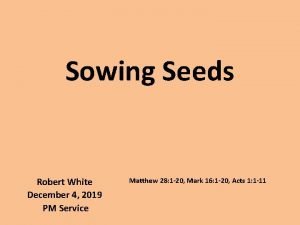The Puritans Sowing the Seeds of Revolution Essential






















- Slides: 22

The Puritans: Sowing the Seeds of Revolution?

Essential Question How might the immigration of the Puritans to New England be seen as sowing the seeds of the American Revolution?

Who were the Puritans? What was their goal? § Puritans were a Calvinist sect of the Anglican Church that believed that the Protestant Reformation in England was incomplete. § Anglican Church was too similar in appearance and practice to the Catholic Church. § Puritan Goal = Reform the Anglican Church

What was so radical about these reforms? § Reform = a more direct relationship with God § Favored a more original, pure, simple church focused on Jesus § Rejected the intrusion of any clergy between God and believer…Puritans read the Bible, prayed, and attended evangelical sermons to seek God § Wanted to reduce the authority of the Anglican Church’s hierarchy of bishops…favored the authority of the local church (Congregational approach) § Puritans came from all aspects of English society, but was especially appealing to the growing middle class of merchants, artisans, businessmen, small land owners and professionals.

What did the Puritans believe? § Sought God’s grace through moral living, prayer, Bible reading, and heeding sermons. § In pursuit of God’s grace, Puritans sought to improve society, often by imposing their moral beliefs. § Believed that those “doing” were the manifestations of those in whom God had elected for salvation

Puritans & Calvinism Puritan Theology: § Only the “elect” were chosen by God for salvation, all others were damned. Puritans considered themselves among the elect. (The elect were eligible for salvation. ) § “Saints” were recipients of God’s grace, but had not undergone a conversion experience. § “Visible Saints” were recipients of God’s grace who had a successful conversion experience and demonstrated that grace with a life of piety.

So how did Calvinism influence the Puritans? Christians have a duty to work hard. Work is way to worship God. Hard work pleases God. Hard work is a sign of the “elect” or God’s chosen. Success in work is a sign of God’s favor and a sign that you are among the elect and possibly a saint. § Helping others beyond survival was against God’s will. § Skills are a gift from God and you are obligated to use it. § § § This often called the Puritan work ethic.

Puritan (Calvinist) Reforms Reform of Church of England Church should be Bible based Reading the Bible Foundational Education & Literacy are now key Emphasis on education (colleges) Emphasis on the written word (contracts)

Why did the Puritans want to leave England? Troubles with the Stuart King, Charles I § Forced conformity to Church of England § Appointed Wm. Laud as Archbishop of Canterbury who favored a retreat from Calvinism § Married a French Catholic princess § Removed many Puritan ministers § Attempts to rule w/o Parliament – collect taxes § Parliament forces Petition of Right on Charles § Ultimately, Charles dissolves Parliament and begins 11 years of “personal rule”.

Radical Puritan Separatists • Believed that the Anglican Church was too corrupt and unable to be redeemed. • True believers must “separate” from the Church of England. • Sought to escape…Scrooby sect to Holland then North America in 1620 on board the Mayflower.

Plymouth Plantation

The Puritans of Massachusetts Bay The larger group of Puritans, led by John Winthrop, left England in 1630. § These are NOT Separatists. § These Puritans will immigrate as family units and sometimes as entire congregations (Natural Population Growth) § Want to create a righteous model for the world…a beacon to the old world…a City on a Hill for all to see. § A secondary reason for migration – financial independence

How might the physical geography of New England appear to limit prosperity at first glance? “Lemons” § No precious metals (gold & silver) § Cold, harsh climate made for a short growing season § Thin, poor rocky soil was not conducive to commercial ag “Lemonade” § Farming tended to be small scale + animal husbandry § Other natural resources were exploited: fish and lumber § Turned early to commercial endeavors: shipping, ship building, commerce

Population Growth during the 1600 s Region Chesapeake Bay New England West Indies Total # of Population in immigrants 1700 in the 1600 s 120, 000 85, 000 25, 000 190, 000 91, 000 33, 000 *An estimated 20, 000 Puritans immigrated to NE between 1630 -1640 in what is known as the Great Migration.

The Puritan Family as the Smallest Commonwealth Gender Balance + Immigration as family units & congregations = Natural Population Growth In New England… If the family was strong & stable How might stability motivate colonists? the common wealth was strong and stable the Congregation (Church) was strong and stable the town was strong and stable

The Puritan “Spiritual Republic” *Important to remember that spiritual freedom was the source of all other freedoms for Puritans. Independent Characteristics of the Puritans: § Rejection of church hierarchy, insisted on local control (congregationalism) § Rejected all distinctions of rank or superiority from wealth or privilege = egalitarian society

The Puritan “Spiritual Republic” The Spiritual Republic was based on the belief that: § The will of the people was the only legitimate source of political power § Political power was properly delegated via elections § The clergy & laity were entitled to equal authority (ministers were approved by the congregation)

Puritans and the Democratic Tradition TOWN = Center of Govt in New England Due to close proximity… § People have to get along and compromise § There’s pressure from society to conform § More opportunities to vote & participate in govt Every town has a MEETING HOUSE for religious and spiritual gatherings. The New England Town Hall meeting was a democratic outgrowth of the Puritans’ tradition of self-governance and local autonomy. Economically, NE was more egalitarian as wealth was more evenly distributed than other colonies and those with more $$$ did not have more political power.

The Stuart Restoration in 1660 Charles II restored to the throne of England § Very Catholic tendencies § Licentious behavior 1681 -85 Charles II rules as an absolute monarch 1685 James II becomes King § Openly Catholic § Rules as an absolute monarch § Birth of a surprise heir Restoration Colonies: Pennsylvania, Carolina, New Jersey, New York

What was New England doing to draw the ire of the last Stuart kings? By the 1640 s, NE had developed a place in the Atlantic network of commerce. § English Civil War opened door to expanded trade: Spain, Portugal, Caribbean By 1680, half of English ships trading in the Caribbean were from NE By 1700, NE ship builders built all ships for America and were beginning to export to England. By 1700, Boston is the #2 ship building center in English empire. In NE, commerce associated with maritime trade was the engine of the economy. What cardinal rules of mercantilism is New England violating?

The Dominion of New England King James II Goals for the Dominion of New England? § force NE to be more obedient § eliminate the colonial assemblies § appoint new draconian royal governor, Sir Edmund Andros § sent more troops to the colonies § aggressively enforced the Navigation Acts § Insisted that colonists left their rights in England

Key Contributions of the Puritans to American Character CAPITALISM: covenant = contracts, prosperity = good business, strong work ethic DEMOCRACY: commitment to elections, tradition of town hall meetings FREEDOM: Congregational system = self-rule, questioning authority TOLERANCE: Developed over time due to growing diversity in NE, business endeavors
 Sowing in the morning
Sowing in the morning Sowing seeds
Sowing seeds Sowing discord kjv
Sowing discord kjv Why are gymnosperms naked seed plants
Why are gymnosperms naked seed plants Law of reaping and sowing
Law of reaping and sowing Sowing behind the country plough
Sowing behind the country plough Economic importance of groundnut
Economic importance of groundnut Essential non essential fatty acids
Essential non essential fatty acids The french revolution begins
The french revolution begins French revolution essential questions
French revolution essential questions Essential questions for industrial revolution
Essential questions for industrial revolution Why did the puritans cross the atlantic ocean
Why did the puritans cross the atlantic ocean Tulip puritans
Tulip puritans Separatists vs puritans
Separatists vs puritans Separatists vs non separatists
Separatists vs non separatists Why did the puritans settle in new england
Why did the puritans settle in new england Quotes about puritans
Quotes about puritans Puritans religion beliefs
Puritans religion beliefs Puritans vs protestants
Puritans vs protestants Puritan literature in america
Puritan literature in america Puritans vs. pilgrims
Puritans vs. pilgrims Which political cultural and economic characteristics
Which political cultural and economic characteristics Separatists vs puritans
Separatists vs puritans
